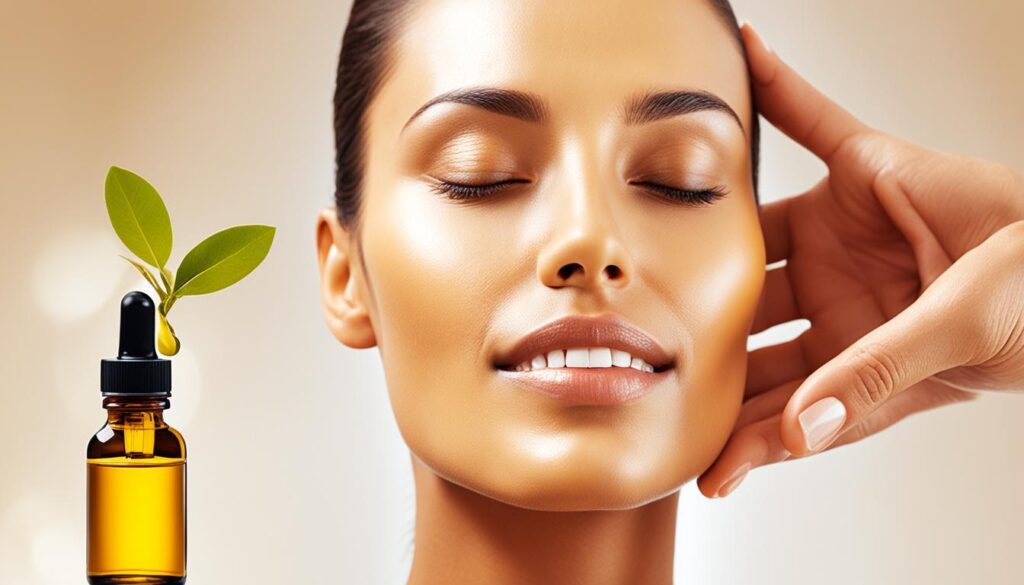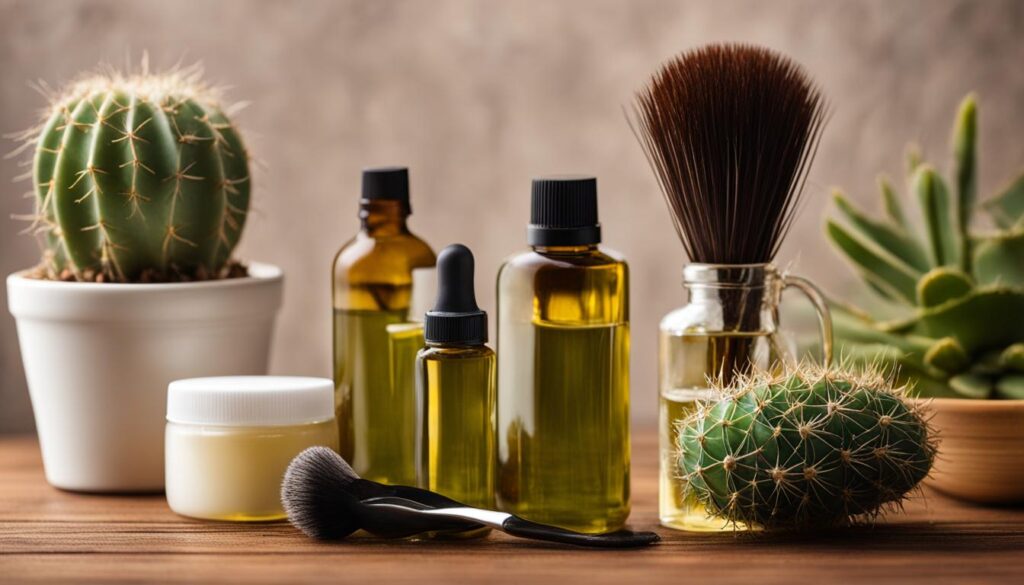Jojoba oil is a versatile and healthy oil that offers numerous benefits for the skin, hair, and overall wellness. Derived from the seeds of the jojoba plant, jojoba oil is rich in vitamins, minerals, and antioxidants that promote healthy skin and hair. It has moisturizing, antibacterial, and anti-inflammatory properties, making it suitable for various skincare concerns, such as acne, eczema, and sunburn. Additionally, jojoba oil can strengthen the hair, improve collagen synthesis, and reduce the appearance of scars and fine lines. With its natural composition and wide range of uses, jojoba oil is a valuable addition to any skincare and hair care routine.
Key Takeaways:
- Jojoba oil is derived from the seeds of the jojoba plant and is rich in vitamins, minerals, and antioxidants.
- It has moisturizing, antibacterial, and anti-inflammatory properties, making it effective for various skincare concerns.
- Jojoba oil can strengthen the hair, improve collagen synthesis, and reduce the appearance of scars and fine lines.
- It is a versatile oil that can be used in various skincare and hair care routines.
- With its natural composition and wide range of benefits, jojoba oil is a valuable addition to any self-care routine.
The Jojoba Plant: A Source of Healthy Oil
The jojoba plant, scientifically known as Simmondsia chinensis, is a woody, grey-green shrub native to the southwestern United States, specifically the states of Arizona, California, and Nevada, as well as Baja California in Mexico. It thrives in warm and dry climates, making it well-suited to regions with arid conditions.
The jojoba plant has also been cultivated successfully in other countries that have similar warm and dry climates, such as Argentina, Australia, and Egypt. The plant produces a fruit that resembles a large coffee bean or acorn, and it is from the seeds in this fruit that jojoba oil is extracted.
Jojoba oil is derived from the seeds of the jojoba plant, making it a 100% natural and sustainable oil.
Jojoba oil is highly prized for its rich composition, which includes essential vitamins, minerals, and antioxidants. These beneficial properties contribute to the oil’s effectiveness in promoting healthy skin and hair.
The image above displays the jojoba plant, highlighting its unique appearance.
The Origins of the Jojoba Plant
The jojoba plant, a member of the Simmondsiaceae family, is native to the southwestern regions of the United States and Baja California in Mexico.
The Ideal Growing Conditions
The jojoba plant thrives in warm and dry climates, making it well-suited to regions with arid conditions. It can adapt to a variety of soil types, including sandy and rocky soils, and it is drought-resistant.
Growing Regions
Jojoba plants are commonly found in the southwestern United States, including Arizona, California, and Nevada. In Mexico, they are primarily found in Baja California. In addition, jojoba plantations have been established in other countries with similar climates, such as Argentina, Australia, and Egypt.
The Extraction Process
Once the jojoba plant’s fruits have ripened, they are harvested and the seeds within are extracted. These seeds are then cold-pressed to obtain the pure and beneficial jojoba oil.
Jojoba oil extraction is a meticulous process that ensures the oil retains its natural qualities and benefits.
| Plant Name | Scientific Name | Native Regions | Ideal Growing Conditions |
|---|---|---|---|
| Jojoba Plant | Simmondsia chinensis | Southwestern U.S., Baja California, Mexico | Warm and dry climates |
Jojoba Oil: A Unique Composition
Jojoba oil stands out from other oils due to its unique composition. Unlike traditional oils, it is classified as a liquid wax, thanks to its high wax content and distinctive properties.
When we take a closer look at jojoba oil, we find a fascinating blend of components. Alongside jojoba wax, the oil contains free fatty acids, alcohols, sterols, antioxidants, and fat-soluble vitamins. These compounds work together to offer a wide range of benefits for the skin, hair, and overall well-being.
One particular component that plays a significant role in jojoba oil is vitamin E. It makes up around 79% of the vitamins found in the oil, contributing to its powerful antioxidant properties. Antioxidants are essential for protecting the skin cells from damage caused by free radicals, environmental factors, and the aging process.
The high level of antioxidants in jojoba oil helps shield the skin from oxidative stress and prevents the oil from spoiling, allowing for its long shelf life. This potent combination of antioxidants and vitamin E is what makes jojoba oil an exceptional moisturizer and skin softener, providing deep hydration and nourishment to the skin.

This image showcases the natural beauty of jojoba oil, emphasizing its unique composition and the glass-like appearance that resembles liquid wax. As an alt attribute, “jojoba oil” encapsulates the keyword related to this section.
Benefits of Jojoba Oil for Skin
Jojoba oil is a natural treasure when it comes to enhancing the health and appearance of your skin. With its unique composition and nourishing properties, jojoba oil offers numerous benefits that can transform your skincare routine.
One of the key advantages of jojoba oil is its moisturizing properties. It acts as a powerful emollient, effectively preventing dryness and flakiness. When applied to the skin, jojoba oil forms a protective barrier that locks in moisture, keeping your skin hydrated and supple.
But jojoba oil does more than just moisturize. It also possesses antibacterial and anti-inflammatory properties, making it an excellent choice for individuals with problematic skin conditions. If you struggle with eczema, psoriasis, or acne, jojoba oil can help alleviate itchiness, redness, and inflammation, providing relief and promoting healthier-looking skin.
Studies have also shown that jojoba oil has the remarkable ability to reduce pain and promote collagen synthesis. As a result, it can help diminish the appearance of fine lines and wrinkles, giving your skin a more youthful and rejuvenated appearance. Additionally, jojoba oil can soothe sunburned skin, providing gentle relief and promoting healing.
When it comes to anti-aging benefits, jojoba oil is a true superstar. Not only does it help improve the elasticity of your skin, but it also contains powerful antioxidants that fight against free radicals, which are known to cause premature aging. Regular use of jojoba oil can lead to firmer, smoother skin with reduced signs of aging.
In summary, incorporating jojoba oil into your skincare routine can lead to moisturized, nourished, and healthier-looking skin. Its moisturizing, antibacterial, anti-inflammatory, and anti-aging properties make it a versatile and valuable ingredient in any skincare regimen.

Discover the wonders of jojoba oil and experience the radiant benefits that it brings to your skin.
Jojoba Oil for Hair Care
Jojoba oil is not only beneficial for the skin but also for hair care. Its moisturizing properties help hydrate the scalp and prevent dandruff. Jojoba oil can create a protective barrier on the scalp, preventing dryness and flakiness associated with scalp psoriasis. Additionally, it conditions the hair, making it softer, stronger, and less prone to split ends. Jojoba oil can regulate sebum production, making it suitable for both oily and dry scalps. It can be used as a leave-in conditioner and applied to the roots to promote hair growth and improve overall hair health.
Various Uses of Jojoba Oil
In addition to being a versatile skincare and hair care product, jojoba oil has a wide range of other uses that make it a must-have in your beauty arsenal. Here are some creative ways to incorporate jojoba oil into your daily routine:
Makeup Remover
Jojoba oil works wonders as a gentle and effective makeup remover. Its natural oils can easily dissolve oil-based makeup, leaving your skin clean and refreshed. Simply apply a few drops of jojoba oil to a cotton pad and gently wipe away your makeup. It’s a great alternative to harsh chemical-based removers.
Cuticle Oil
Give your nails some extra TLC with jojoba oil as a cuticle oil. Apply a small amount of jojoba oil to your cuticles and massage gently. It helps moisturize and nourish the skin around your nails, promoting healthy nail growth and preventing dryness and cracking.
Nighttime Skincare
Jojoba oil is a fantastic addition to your nighttime skincare routine. As a final step in your routine, apply a few drops of jojoba oil to your face and massage it into your skin. This will provide deep hydration and moisture, leaving your skin soft and supple by morning.
Leave-in Hair Conditioner
If you’re looking to tame frizz and keep your hair looking healthy and shiny, jojoba oil can be used as a leave-in conditioner. Rub a small amount of jojoba oil between your palms and apply it to the ends of your hair, working your way up. This will help moisturize your locks without weighing them down.
Diluting Essential Oils
If you love using essential oils for their therapeutic benefits, jojoba oil makes an excellent carrier oil for dilution. Essential oils are potent and should be diluted before applying to the skin. Mix a few drops of your favorite essential oil with jojoba oil to create a safe and effective topical solution.
| Uses | Benefits |
|---|---|
| Makeup remover | Easily removes oil-based makeup without clogging pores |
| Cuticle oil | Moisturizes and nourishes the nails and surrounding skin |
| Nighttime skincare | Provides deep hydration and moisture |
| Leave-in hair conditioner | Tames frizz and leaves hair healthy and shiny |
| Diluting essential oils | Acts as a carrier oil for safe and effective topical application |
With its versatility and numerous benefits, jojoba oil is a valuable addition to your beauty routine. Whether you’re using it as a makeup remover, cuticle oil, or leave-in conditioner, jojoba oil can help enhance your natural beauty and keep your skin and hair looking their best.

Safety and Potential Side Effects
While using jojoba oil is generally safe for topical application, it is important to be aware of potential side effects that may occur. Some individuals, especially those with pre-existing skin conditions, may experience allergic reactions when using jojoba oil. Symptoms of an allergic reaction can include itching, redness, hives, and in severe cases, difficulty breathing. It is recommended to perform a patch test before using jojoba oil for the first time to check for any adverse reactions.
It is also crucial to note that jojoba oil is not meant to be ingested. If consumed, it may cause digestion issues such as stomach discomfort, nausea, or diarrhea. To avoid these problems, it is important to use jojoba oil as directed and refrain from ingesting it.
Patch Test: How to Perform
To perform a patch test with jojoba oil:
- Clean a small area of skin, such as the inner forearm or behind the ear.
- Apply a small amount of jojoba oil to the area and gently massage it into the skin.
- Leave the oil on the skin for 24 hours without rinsing.
- Monitor the area for any signs of allergic reactions, such as redness, itching, or swelling.
If no adverse reactions occur during the patch test, it is generally safe to use jojoba oil topically. However, if you experience any discomfort or allergic reactions, it is recommended to discontinue use and consult a healthcare professional.
Remember, even natural ingredients like jojoba oil may cause adverse reactions in some individuals. It is always best to err on the side of caution and seek medical attention if needed.
| Potential Side Effects | Precautions |
|---|---|
| Allergic reactions | Perform a patch test before using jojoba oil topically. Discontinue use if any adverse reactions occur. |
| Digestion issues | Do not ingest jojoba oil. Use it externally only. |
| Use jojoba oil as directed and seek medical attention if any discomfort or severe reactions occur. |
Where to Find and How to Use Jojoba Oil
Jojoba oil is a versatile and beneficial oil that can be easily found in various forms and price points. When searching for jojoba oil, it is recommended to look for organic and cold-pressed options. These types of jojoba oil retain the most antioxidants and offer the highest quality.
You can find jojoba oil in a wide range of skincare products, including moisturizers, lotions, serums, and facial oils. Many well-known brands incorporate jojoba oil into their formulations due to its hydrating and nourishing properties. When choosing skincare products, look for those that mention jojoba oil as an ingredient for optimal benefits.
In addition to skincare products, jojoba oil is also a popular ingredient in hair care products such as conditioners, treatments, and hair oils. It helps moisturize and condition the hair, making it soft, smooth, and manageable. Look for hair care products that feature jojoba oil to improve the health and appearance of your hair.
To use jojoba oil, you can apply it directly to your skin or hair. It is a non-greasy oil that absorbs quickly, leaving no residue. For skincare, it can be applied as a facial moisturizer, a natural makeup remover, or mixed with other oils for a customized skincare blend.
For hair care, jojoba oil can be applied directly to the roots to moisturize and stimulate hair growth. It can also be used as a leave-in conditioner to tame frizz and add shine to your hair.
Using Jojoba Oil for Skincare
Listed below are various ways to use jojoba oil for skincare:
- Apply a few drops of jojoba oil to cleansed skin as a moisturizer.
- Use it as a natural makeup remover by gently massaging it onto your skin and wiping it off with a clean cloth.
- Mix a few drops of jojoba oil with your favorite facial oil for added hydration and nourishment.
- Apply jojoba oil to dry, rough patches of skin to soothe and soften.
- Massage jojoba oil onto your cuticles to moisturize and promote healthy nail growth.
Using Jojoba Oil for Hair Care
Listed below are various ways to use jojoba oil for hair care:
- Apply a small amount of jojoba oil to your scalp and massage it in to moisturize and prevent dandruff.
- Use it as a leave-in conditioner by applying a few drops to the ends of your hair, focusing on dry or damaged areas.
- Add jojoba oil to your favorite hair mask or conditioner for an extra boost of hydration.
- Apply jojoba oil to your hair before swimming to protect it from the drying effects of chlorine or saltwater.
| Skincare Products | Hair Care Products |
|---|---|
| Moisturizers | Conditioners |
| Lotions | Treatments |
| Serums | Hair oils |
| Facial oils |
Overall, jojoba oil is a versatile and beneficial oil that can be easily incorporated into your skincare and hair care routine. By choosing organic and cold-pressed options, you can ensure the highest quality and enjoy the full benefits of jojoba oil. Whether you use it directly on your skin or hair or through skincare and hair care products, jojoba oil is a valuable ingredient for achieving healthy and radiant skin and hair.
Jojoba Oil as a Natural Ingredient
When it comes to natural skincare and hair care, jojoba oil is a game-changer. Its unique composition, rich in antioxidants and vitamin E, makes it a powerful ingredient for promoting healthy skin and hair. The benefits of jojoba oil go beyond mere moisturization, as its properties extend to nourishing, protecting, and enhancing the overall health of your skin and hair.
Thanks to its natural origin, jojoba oil is free from harmful chemicals and additives commonly found in commercial skincare and hair products. By incorporating jojoba oil into your daily skincare and hair care routine, you’ll be embracing the power of nature to achieve healthier and more radiant skin and hair.
Jojoba oil provides numerous benefits for both the skin and hair. With its unique composition, rich in antioxidants and vitamin E, it promotes healthy skin and helps fight against oxidative stress.
Antioxidant-rich for Healthy Skin
Antioxidants play a vital role in preserving the health and vitality of your skin. Jojoba oil is packed with these powerful compounds, which help protect your skin from the damaging effects of free radicals and environmental pollutants. By combating oxidative stress, jojoba oil promotes healthier, more youthful-looking skin.
The high concentration of vitamin E in jojoba oil adds to its antioxidant benefits, further supporting the health and integrity of your skin. Vitamin E is known for its ability to nourish and regenerate skin cells, enhancing the appearance and overall quality of your skin.
Effective for Natural Skincare
Jojoba oil’s moisturizing properties make it an excellent choice for natural skincare. It deeply hydrates and nourishes the skin, leaving it soft, supple, and glowing. Unlike synthetic moisturizers that can cause clogged pores and breakouts, jojoba oil is non-comedogenic and suitable for all skin types, including oily and acne-prone skin.
The antibacterial and anti-inflammatory properties of jojoba oil make it effective in addressing common skin concerns such as acne, eczema, and inflammation. It helps calm irritated skin, reduce redness, and promote a healthier complexion.
Enhancing Hair Care Routine
Jojoba oil is not just for skincare—it also works wonders for your hair. Its moisturizing properties deeply penetrate the hair follicles, hydrating the strands from within and preventing dryness and breakage. Regular use of jojoba oil can improve hair strength, reduce split ends, and promote overall hair health.
In addition to its moisturizing benefits, jojoba oil helps regulate sebum production, making it ideal for both dry and oily scalps. It can be used as a leave-in conditioner or applied directly to the roots to promote hair growth and maintain a healthy scalp.
A Valuable Ingredient for Natural and Effective Solutions
Incorporating jojoba oil into your skincare and hair care routine is a natural and effective way to promote healthy skin and lustrous hair. Whether you’re looking to fight off signs of aging, address specific skin concerns, or enhance the overall health of your hair, jojoba oil is a valuable ingredient that can deliver remarkable results.
So, why rely on artificial ingredients and harsh chemicals when you can harness the power of jojoba oil for natural beauty? Embrace the benefits of this versatile oil and experience the remarkable difference it can make in your skincare and hair care routine.
References:
- Sornpet, S., et al. (2021). Anti-inflammatory and Skin Barrier Repair Effects of Simmondsia chinensis (Jojoba) Seed Oil in a Hydrogel Carrier. Molecules, 26(9), 2448.
- Prager, N., et al. (2006). A randomized, double-blind, placebo-controlled trial to determine the effectiveness of botanically derived inhibitors of 5-alpha-reductase in the treatment of androgenetic alopecia. Journal of Alternative and Complementary Medicine, 12(2), 287-294.
- Pazyar, N., et al. (2013). Jojoba in dermatology: a succinct review. Giornale Italiano di Dermatologia e Venereologia, 148(6), 687-691.
The Power of Jojoba Oil: From Ancient Remedies to Modern Skincare
Jojoba oil has a rich history dating back centuries, where it was widely used by Native Americans for its healing properties. They recognized the benefits of this natural oil and employed it in the treatment of various skin and scalp conditions, including psoriasis and acne.
The ancient remedies of the Native Americans have paved the way for modern skincare, highlighting the power of jojoba oil as a natural and effective ingredient.
In recent years, scientific studies have further investigated the potential of jojoba oil in skincare. These studies have confirmed its effectiveness in addressing common skin concerns such as acne, eczema, and sunburn. Additionally, research has shown that jojoba oil can aid in wound healing and promote collagen synthesis, making it a valuable asset in skincare formulations.
The knowledge passed down through generations combined with the findings of modern research underscore the significance of jojoba oil as a potent and natural skincare ingredient. Its versatile properties make it suitable for various skin types and concerns.
Conclusion
In conclusion, jojoba oil is a versatile and natural ingredient that provides a myriad of benefits for both the skin and hair. With its unique composition, rich in vitamins, minerals, and antioxidants, jojoba oil offers moisturizing, soothing, and protective properties for the skin. It can effectively treat various skin conditions, prevent acne and sunburn, and promote anti-aging effects, leaving the skin healthy and radiant.
Additionally, jojoba oil strengthens the hair, stimulates growth, and improves overall hair health. Its ability to regulate sebum production makes it suitable for different hair types, while its moisturizing properties nourish the hair and prevent issues like dandruff and split ends. Incorporating jojoba oil into your skincare and hair care routine is a natural and effective way to achieve healthy and beautiful skin and hair.
Whether used as a moisturizer, makeup remover, cuticle oil, or leave-in conditioner, jojoba oil provides natural and holistic solutions for skincare and hair care. With its numerous benefits and proven effectiveness, it is no wonder that jojoba oil has become a popular choice among individuals seeking a natural and effective alternative in their beauty routines. Embrace the power of jojoba oil as a natural ingredient and unlock the secrets to vibrant, youthful-looking skin and lustrous, nourished hair.
FAQ
Is jojoba oil good for the skin?
Yes, jojoba oil is excellent for the skin. It acts as a natural moisturizer, nourishing and hydrating the skin. It also has antibacterial and anti-inflammatory properties, making it effective in treating acne, eczema, and other skin conditions.
Can jojoba oil be used on the hair?
Absolutely! Jojoba oil is beneficial for hair care. It moisturizes the scalp, prevents dandruff, and conditions the hair, making it softer and stronger. It can also promote hair growth and regulate sebum production.
What are the different uses of jojoba oil?
Jojoba oil has various uses. It can be used as a makeup remover, cuticle oil, and moisturizer for the skin. It can also be used as a leave-in hair conditioner and to dilute essential oils before topical application.
Are there any side effects of using jojoba oil?
While jojoba oil is generally safe for topical use, it may cause allergic reactions in some individuals. It is important to perform a patch test before using jojoba oil for the first time. It should not be ingested as it may cause digestion issues.
Where can I find jojoba oil and how should I use it?
Jojoba oil is widely available in skincare and hair care products. Look for organic and cold-pressed options for the highest quality. It can be applied directly to the skin or hair and does not need to be diluted. Use it as the last step in your skincare routine or on the roots for hair care.






